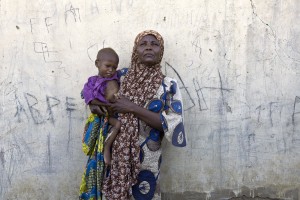UNHCR urges CAR to let refugees take part in elections
About 190,000 people presently hosted in Cameroon, Chad, the Democratic Republic of the Congo and the Republic of Congo would be eligible to vote
In the Central African Republic, UNHCR and its partners are alarmed at the interim government’s recent decision to exclude CAR refugees in neighbouring countries from taking part in elections expected in October this year. There are currently some 460,000 CAR refugees (a tenth of the population), mainly in Cameroon, Chad, Democratic Republic of the Congo and Republic of Congo. About 190,000 would be eligible to vote and the refugee population includes a large proportion of Muslims. UN Security Council resolutions 2149 (2014) and 2217 (2015) envisage inclusive elections to help achieve peace and, to this end, it is important that refugees and internally displaced people are allowed to vote.
But the CAR National Transitional Council has rejected provisions in the draft electoral bill allowing Central African refugees to vote. Those who wish to vote must now first return to CAR, where continued tension and violence makes it unsafe for most people to return. We are concerned that this decision (on June 30) will exclude a significant section of the electorate from taking part in the political process that should lead to democratic and inclusive elections and aim at restoring peace and reconciliation among different communities. Meaningful national reconciliation could be jeopardized and the conditions for continuing conflict created if refugees cannot vote. UNHCR, at the request of the CAR National Elections Authority, had since early June been facilitating the participation of CAR refugees in the upcoming electoral process. The refugees were enthusiastic about being able to vote.
We believe it would be a serious setback, not to say dangerous, to exclude refugees from the elections, which are the culmination of a political process to which refugees have contributed and which was being conducted in the spirit of transparency and inclusiveness. We call for the participation of refugees in the elections to help decide the future of their country. Free, transparent and inclusive elections can contribute to peace-building, security and national reconciliation and ultimately pave the way for the return in safety and dignity of all the refugees. UNHCR and its partners, including the Humanitarian Coordinator Aurelien Agbenonci and the UN stabilization mission, will continue in talks with the transitional government to raise the issue of refugee participation in the elections and urge them to allow refugees to take part.
For more information on this topic, please contact:
In Bangui, Ndeye Marie Cisse, cisse@unhcr.org, +236 723 79786
In Geneva, Leo Dobbs,dobbs@unhcr.org, +41 79 883 6347
Pour le HCR, la République centrafricaine doit permettre aux réfugiés de voter
Près de 190.000 réfugiés actuellement au Cameroun, au Congo, en DRC et au Tchad seraient éligibles pour voter.
Le HCR a fait part de sa préoccupation sur la décision du Parlement de transition d'exclure des prochains votes, prévus en octobre prochain, les réfugiés ayant fui dans les pays voisins et au-delà pour échapper aux combats dans leur pays. Le HCR et ses partenaires ont indiqué que cette décision ne respecte pas les résolutions du Conseil de sécurité des Nations Unies 2149 (2014) et 2217 (2015) qui prévoient des élections inclusives pour aider à rétablir la paix.
« Dans cet objectif, il est important que les réfugiés et les personnes déplacées internes puissent voter », a indiqué le porte-parole du HCR Leo Dobbs lors d'un point de presse à Genève. On compte actuellement quelque 460 000 réfugiés centrafricains (soit un dixième de la population), principalement au Cameroun, au Tchad, en République démocratique du Congo et au Congo.
« Environ 190 000 d'entre eux pourraient voter. La population réfugiée comprend une grande proportion de musulmans », a ajouté Leo Dobbs. « Les personnes qui souhaitent voter doivent tout d'abord rentrer en RCA, ce qui est impossible pour la plupart des Centrafricains du fait de la poursuite des tensions et des violences. »
Toutefois le Conseil national de transition de la République centrafricaine a rejeté les dispositions du projet de loi électoral permettant aux réfugiés centrafricains de voter. Du fait de cette décision (datée du 30 juin), le HCR craint qu'une partie importante de l'électorat ne puisse prendre part au processus politique qui devrait conduire à des élections démocratiques et inclusives pour rétablir la paix et réconcilier les différentes communautés.
« Nous sommes convaincus que ce serait un sérieux revers, pour ne pas dire dangereux, d'exclure les réfugiés des élections qui sont l'aboutissement d'un processus politique où les réfugiés ont contribué et qui a été mené dans un esprit de transparence et d'inclusion. Nous appelons à ce que les réfugiés puissent voter afin d'aider à décider de l'avenir de leur pays », a indiqué Leo Dobbs, ajoutant : « Des élections libres, transparentes et ouvertes peuvent contribuer à la consolidation de la paix, de la sécurité et de la réconciliation nationale et permettre le retour dans la sécurité et la dignité pour tous les réfugiés. »
Le HCR et ses partenaires, y compris le Coordonnateur humanitaire Aurélien Agbenonci et la mission de stabilisation des Nations Unies, poursuivront les pourparlers avec le gouvernement de transition sur la participation des réfugiés aux élections et l'autorisation pour les réfugiés de prendre part au vote.



















